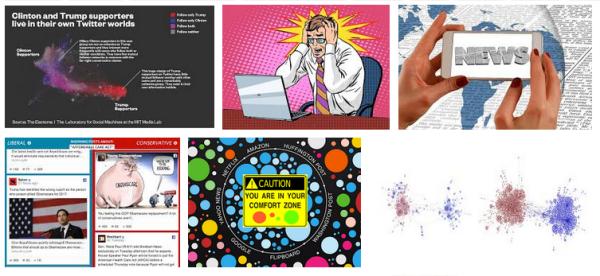On the real impact of fake news, echo chambers and filter bubbles
Fake news, echo chambers, filter bubbles: how much do they REALLY create or influence people’s opinions on politics, or anything else?
What is the real “polarization” created by social media like Facebook, and what are its real consequences, if any? In this post I have collected some tweets, quotes and links showing that, as Facebook would say “it’s complicated”. But real.

It's complicated
</em></u>
The starting point is the New York Times article titled “Fake News and Bots May Be Worrisome, but Their Political Power Is Overblown”, whose subtitle is “It’s very hard to change people’s minds, especially when so many are already committed partisans.”
Brendan Nyhan summarized that article in three points:
- Fake news exposure is concentrated among small but intense subsets
- Probably, as NYT observes fake news didn’t change many votes
- Most people are not in echo chambers
and concluded that: “Core of problem is a small, intense subset, not the majority. All this doesn’t mean fake news and other online misinformation aren’t big problems - they are! - but we need to avoid loose talk about big persuasion effects and ubiquitous echo chambers. Causes us to misunderstand the challenges we face and the best ways to address them.”
There isn’t much evidence that social media is good at…
A great, much more detailed analysis of the same article is in this Twitter thread by Molly MkKew, reformatted and pasted below this post for your convenience. It’s all great, but the points I personally find more relevant are:
- targeting a hardened 10% is more effective than trying to persuade people to change their minds.
- In strict voter turnout terms, a radicalized base is more powerful than most other factors.
- social media is “pretty good at radicalizing people.There isn’t much evidence it is good at deradicalizing people.”
A Facebook bots experiment
Shortly after I saw all those tweets I came across another article about “how the Facebook algorithm insulates fascists from reality”. The authors created six Facebook bots, each “configured” to show explicit sympathy for a different italian political party, then recorded the corresponding news feeds for three weeks. Eventually, they observed that “the bot pretending to be a fascist, enjoyed a radically different news feed experience from the others”. That bot was exposed to a much smaller variety of posts, repeated way more often than normal. It was “segregated by the algorithm, only receiving content from a very narrow political area.”
Insulating extremists from reality. ANY kind of “extremists”
I have collected these quotes here because they confirm, and explain very well, some ideas I had started to form myself about these issues: OK, the “background” power of fake news, bubbles and so on on the general population, especially when it comes to modify their ideas, is likely overblown.
But in politics (or anything else) what matters is to target and maintain motivation of the ones who STILL vote, especially those who would vote for you anyway. Those are the only ones you need to keep inside their pre-existing filter bubbles or echo chambers: “a small, intense subset, not the majority”.
The real problem of fake news, echo chambers, filter bubbles… is, borrowing and rewriting that NYT subtitle, that whenever people are “already committed partisans”, current platforms and their algorithms “make it even harder than before to change their minds”.
And the “fascist bot” experiment may mean that the most extreme your initial ideas were to begin with (on any issue, from politics to food, fashion and kittens), the worst things get.
Now put social media like these on top of:
- the general, pre-existing issue of “Dictatorship of Small Minorities” that makes “entire populations submit to the preferences of a three or four percent of its intransigent members”
- increasing average age and astensionism among young people in many “first world” countries, which you should read as:
“many of the most powerful governments of the world just need to convince steadily decreasing quantities of their less (on AVERAGE, of course!!!) mentally agile citizens to stay in power”
and things don’t look good. The only suggestions I can give right away are:
- make as many people as possible VOTE (think Brexit, Trump, the current situation in Italy etc… before saying “it wouldn’t change anything”). It’s not the ONLY tool, but it’s one that must be used by everybody who can
- demand new architectures for social media, that do not NEED to have certain effects. One of them may be this proposal of mine, but it’s not the only one
Who writes this, why, and how to help
I am Marco Fioretti, tech writer and aspiring polymath doing human-digital research and popularization.
I do it because YOUR civil rights and the quality of YOUR life depend every year more on how software is used AROUND you.
To this end, I have already shared more than a million words on this blog, without any paywall or user tracking, and am sharing the next million through a newsletter, also without any paywall.
The more direct support I get, the more I can continue to inform for free parents, teachers, decision makers, and everybody else who should know more stuff like this. You can support me with paid subscriptions to my newsletter, donations via PayPal (mfioretti@nexaima.net) or LiberaPay, or in any of the other ways listed here.THANKS for your support!